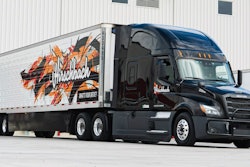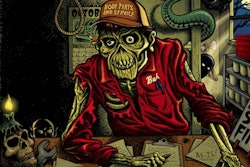![Shutterstock 1372665350[1]](https://img.truckersnews.com/files/base/randallreilly/all/image/2021/11/shutterstock_1372665350_1_.618562adc1c99.png?auto=format%2Ccompress&q=70&w=400)
Earlier this year, the federal government asked members of U.S. transportation industries for their thoughts on problems within the supply chain. To no one's great surprise, the feds got an earful from a variety of trade associations, including those representing trucking interests, carriers, and businesses that rely on trucking. Individual truckers also weighed in with comments that will be used to inform a report to President Joe Biden early next year.
Over 450 comments were submitted before the Oct. 16 deadline. Transportation Secretary Pete Buttigieg will consider them as he oversees the preparation of the report Biden requested.
Individuals -- mostly truckers and those who have retired from or left the industry -- weighed in with a familiar litany of frustrations drivers face on a regular basis. Among them were issues similar to those listed in the annual report compiled earlier this year by the American Transportation Research Institute.
Among the issues drivers say play havoc with their work lives and the orderly operation of the supply chain include:
- driver pay and benefits
- electronic logging devices
- the lack of safe and secure parking
- hours of service
- access to food and services while on the road
- fuel and truck prices
- training standards
- government regulations
- delays at shippers and receivers
Here's what some of the many drivers had to say. (Comments are edited for the sake of brevity, clarity, and readability.)
Michael Gilsinger: “Go back pre-Jimmy Carter era, regulate trucking and force companies to pay drivers the higher wage they deserve. I am a CDL instructor, who has been driving for over 40 years. I am telling you higher wages and training will solve the problem. Take the commuter lanes in major areas and turn them into truck-only lanes to alleviate traffic."
Andrew Roussel: “I have 13 years of driving and the biggest problem that keeps returning is shippers and receivers. They never stand by the set appointment times. For example, the last load I picked up I set for three hours before I got a door and six hours in the door. It literally wasted all my drive time and this happens multiple times a week.”
Richard Conklin: “As a trucker, there are not enough facilities for truckers to utilize. Restaurants, rest areas, parking. The food selection out on the road is horrible, all fast food. Truck stops have taken out sit down restaurants for fast food. Not a healthy situation. The way the truckers are treated by the public is sickening. All these inspections of trucks are not for safety. It’s a revenue generator for cities, counties, and states. The four-wheelers are doing far worse unsafe driving and their vehicles are not mechanically sound either. Many drivers like me are leaving the profession in droves.”
Terry Hanner: “This could be simplified with a board of professional drivers. In turn, they can work directly with the Secretary of Transportation to get feedback on what is going on in real-time especially in hotspot sectors. Currently, a lot of the major trucking companies have leadership with zero experience behind the windshield."
Diane O’Kelly: “If you want to encourage more people to become truck drivers, then demand that we get paid fair wages. We don't get paid for any "on duty" work nor do we get paid for our "off duty" and "sleeper berth" time despite being at work. The average truck driver makes the same exact wage that drivers were making in the 1970s despite the increase in the cost of living. $800 per week was a lot in the 1970s but today it's hardly worth the sacrifice we make and the danger we are put in by the motoring public."
Richard Davis: “Times have changed a lot in the past 85 years in the trucking industry. More regulation has caused a lot of that change. ELDs caused even more change, unfortunately, we still are held back in the time of the '30s. Truck drivers are required or forced to work for free many hours a week. The government restricts the amount of time a driver can work and make money. ELDs cause drivers to rush, hurry, speed, cut corners to save every precious minute they can in a day."
Ryan Zadow: “Force shippers and receivers to abide by a strict two-hour detention rule. Force grocery warehouses to hire dock workers instead of using lumper services. Everybody knows that lumper services are a scam.”
Ronal Toews: “Here is the solution to all this mess. Get rid of the FMCSA. Get rid of the ELDs Put all trucks back to pre-emissions. Mandatory two years experience before driving solo. Make all electronic devices automatically shut off after 25 mph except talking on the phone. Then all of your transportation problems will be solved. But sadly this will never happen. I have been a truck driver and owner-operator since 1988. It used to be enjoyable out on the road. But now it is absolutely horrible.”
Jaden Wilson: “In my opinion as a truck driver, the best way to solve shortages related to COVID-19 is to reconsider electronic logbooks. Along with increasing truck accidents they make delivering essential goods such as food harder than it has to be. When it comes down to it you’re driving while tired and trying to sleep while being wide awake. They force drivers to run over the speed limit and drive while tired thus increasing truck wrecks. We saw a decrease in truck wrecks during the hours of service exemption during COVID. This is because we could take our time, drive the speed limit, and stop for a nap without running out of hours.
Douglas Tramel: “I think that trucks should travel in the left lane while going around big cities, that have a bypass, because 99.9% of the time they are just passing through. Better parking areas that have bathrooms for the drivers, and not have law enforcement waking you up telling you that you have to leave. Start inspecting cars and pickup trucks as DOT inspects us. Better pay. Better health insurance.
Ray Ogden: “Eliminate the speed limit disparity between cars and commercial vehicles. It creates slowdowns that cause traffic jams periodically and usually for no other reason than two trucks trying to pass at 55 mph and the rest of traffic is trying to go 10 or more mph faster. Also, the hours of service need to be relaxed. Most grown men can take a break when they feel tired instead of when someone tells them to."
Juan Vazquez: “Not enough rest stops for required 30 breaks and resets. A majority of rest stops in Nevada are permanently closed.”
James Harris: "How about you guys let us older driver's run paper logbooks. We are responsible enough to know when we are tired. A computer should never tell us when we should have to pull over and go to bed. Thank you for hearing me. 21 years out here and I've never seen it so bad.”
Thomas Trzaska: ”As an OTR truck driver, my issues typically arise when picking up but more often delivering product. There need to be federally mandated detention rules that get assessed for warehouses keeping drivers on location for extended periods of time. In terms of unloading and where locations utilize lumpers, drivers should be allowed to unload their trucks at the same rate that the lumper service charges. Those two actions alone would solve trucks from being delayed longer than they need to be and keep them moving onto the next load."
German Delvalle: “If you want to improve this mess, invoke a mandate and take action so truckers can have access to affordable trucks. Get rid of the FET, which is sending these trucks over $200,000. We need to make trucks affordable again."
Jerry Wheeler Jr.: “There is no driver shortage. For one thing, there is a shortage of pay for the delivery of freight to the big box stores. No one wants to pay for the time a truck driver leaves home and comes back home. I put in 69 hours last week. I don't mind working and being away from my family, but I want to be paid just like everyone does”
William Crawford: “If you seriously want to fix the supply chain, just fix the ELD requirements. Set the ELDs to time drivers' drive time when they drive in excess of 40 mph. All miles driven under 40 mph would not decrease the drivers driving time limits.”
Ariel Prado: “Based on my experience, the biggest issue I see is loading/unloading. They don't let drivers help in these long processes, but they hold drivers for up to 8 hours in a dock. They can either let us help so we keep moving, or have a maximum amount of allowed hours to work on us. The other issue, brokers. Brokers have been lying on rates for quite a bit, but now they lie about weight, appointment times, and loaded miles. An institution must be created to oversee their ways of operations, the same way we (truckers) have FMCSA, DOT, etc”
Sharon Weems: “We are so regulated by the FMCSA that we simply cannot keep up with demand. There is NOT a driver shortage, there is a government in the way creating huge roadblocks. I, an owner-operator with one truck and one trailer, have been shut down for over a month because of a simple transposed number by a government data entry person. The data entry has cost me personally over $600. Government is impeding the movement of freight, not the awesome truckers out here.”
James Denton: “Things in the trucking industry would go a lot better if (1) shippers and receivers would or could be held accountable for our lost time waiting hours to load or unload. (2) Trucking companies would at least pay the drivers for their lost time fairly. (3) Everyone says there is a driver shortage and it's true and will get worse as time goes by as we are treated like third-class citizens by shippers and receivers and most companies along with DOT. Been driving for 30 years this coming November and it has gotten worse with how bad and how much we are regulated."
Bob Keene: “The main reason the next generation says they're not interested in trucking is driver-facing cameras. I can't blame them. No one wants a camera in their face all shift.”
Jim Everson: “Our highways are overcrowded and dangerous. Law enforcement does not enforce traffic laws and people's driving is becoming increasingly dangerous especially in work zones, this by itself is a large cause of freight delays as there are a ridiculously large number of speed-related crashes. Another area of concern is the lack of parking for trucks, especially east of the Mississippi. Truck stops are full by noon-1400 and everyone else is left to park wherever they can, off-ramps, retail parking lots, etc.
Benjamin Reed: “The supply chain disruptions are a direct result of shutting down the economy for a year. Everything operates on a just-in-time inventory, which is made possible by millions of folks showing up for work each and every day. When those folks are told to “stay safer at home”, everything falls like so many dominoes.”
Angi Johnson: “As an OTR driver, I prefer to drive at night, specifically because there is so much less traffic than during the day. As a night driver, the biggest issue that I'm facing is finding food. Restaurants at truck stops used to be open 24/7 to accommodate those of us that drive at night. Ever since the pandemic hit and restaurants initially shut down, very few have gone back to being open past 8-9 p.m.. I generally don't start my clock until after 7 p.m., and it's midnight before I'm even thinking about food. I can't even get something as simple as a hot dog most of the time."
Patricia Meier: “I am a female Class A driver doing a regional route throughout the Midwest. I do not believe that schools and instructors are teaching trainees lane management. It is so scary to pass anybody anymore because too many drivers travel over the middle line. Curves are not navigated properly. Driver's do not watch their mirrors. Cars are also an issue. Roads are so rough it makes a driver feel sick. Parking areas are so limited it is sometimes hard to find safe places to park.There is no courtesy anymore. Very aggressive, unfriendly drivers are taking over."
Trucking companies also had their say:
Bridgeport Trucking: “Without Trucks America Stops" I firmly believe that something must be done to attract drivers to this industry because without them we, as a country, will be in trouble because truck driving is no longer attractive. I believe the following issues MUST be addressed to make it attractive: 1- driver pay, 2-truck parking/more rest areas, 3-holding shippers/receivers accountable by making them load/unload trailers within two hours, 4-Making shippers/receivers responsible for lumper services instead of having the trucking cos responsible for this, 5-Shippers/Receivers providing drivers with access to bathrooms/waiting facilities while the trailer is being loaded/unloaded, and 6-better roads.”
Hawkins Trucking: “The main supply chain issue I see is customer delays on both pick-ups and deliveries. Customers are delaying trucks for hours while others are loading in an hour or unloading. Three and four hours and sometimes even seven and eight hours is inexcusable. Imagine the work that could be done in those extra hours if customers were efficient in their part of the supply chain. There is a lack of accountability in that section as well. Most do not compensate or just plain do not care. These delays also cause trucks to air idling for hours in docks if not equipped with auxiliary power units, therefore, making the carbon footprint larger due to excessive idling. Until customers are reined in on their inefficiency there will always be supply chain issues and higher carbon emissions.”
Phoenix Hauling: “For the love of God, please do something about detention pay for shippers/receivers that are running six,12 sometimes 36 hours behind! Each truck and trailer I own needs to average $1,400 a day to be profitable. Between the insane insurance ( $212,000/year for five trucks and four trailers) increasing fuel costs, tolls, lack of parts for repairs, downtime because of the lack of mechanics, it is almost impossible to turn a profit."
AFZ Cartage: “There needs to be more enforcement of safety violations. Trucking companies need to be held accountable for their unsafe equipment with a national database for repeat offenders and connect CDL licenses in a nationwide database to remove unsafe drivers from American highways."
Stanley Reid Trucking Inc. “Educate motorists with simulators about the physics of 80,000-pound vehicles. Stopping distance, cornering needs, mirror limitations, and acceleration expectations. Mandate lane closures night time only where possible. Enforce left lane passing only. Enable Qualcomm speed-regulated trucks to stay right until passing maneuver possible. Link Port RFID tags to the email of the carrier for pickup releases. Denote lane speed variances on multi-lane roadways, i.e. left lane 75 to 80, middle lane 65 to 75, shoulder and exit lane 65 or less.”












